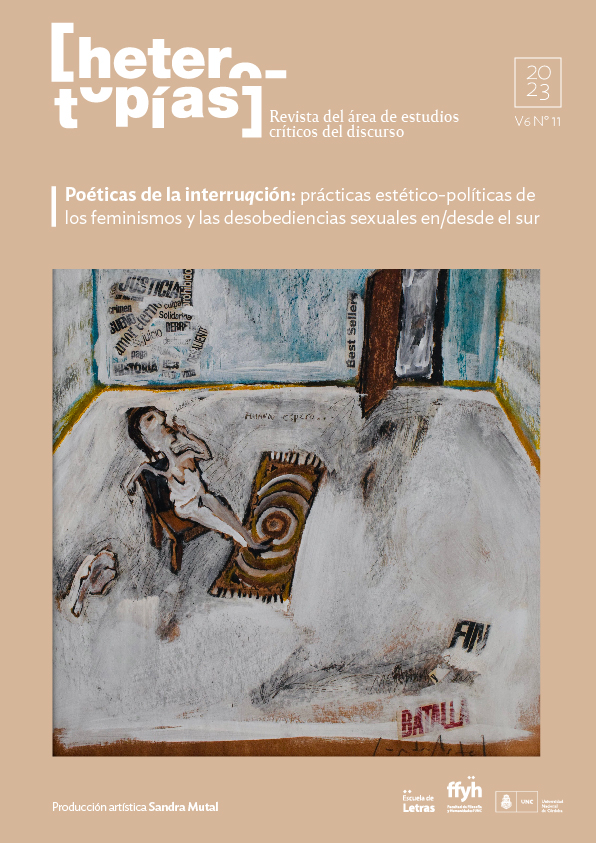Desanthropic emancipations: transitions and dissidences inside and outside the body
Main Article Content
Abstract
The objective of this work is to demonstrate that deconstructing, disarming and reflecting on the category of human, established from an almost universal anthropic principle, it is possible to think of a disanthropic turn that allows us to reconfigure and promote, from the revision of some artistic and visual practices. , other corporalities, identities and enunciative breaks that can encourage other -more respectful- links that challenge and are faithful to the contemporary social and cultural climate.These relationships make possible another type of articulation of man with the planet, of the human with other non-human lives, because it is dislocated from that anthropic centrality that makes it dictate the norm.In the first section, we will present a state of the art about the relationship nature, body, norm and dissidence, in a second section, we will explore the photographic work of Madalena Schwartz "Las metamorfosis" - presented at the Museum of Latin American Art of Buenos Aires in collaboration with the Moreira Salles Institute of Brazil - linking it with that hegemonic discourse on the duty of the body and of the human being in a scenario of repression.In a third part, entitled emancipations, we will reflect on some possibilities to promulgate reciprocal social and human consciences that would be possible from the deconstruction and emptying of the idea of the human in contemporary society.
Downloads
Article Details

This work is licensed under a Creative Commons Attribution-NonCommercial-ShareAlike 4.0 International License.
Those authors who have publications with this journal, accept the following terms: Those authors who have publications with this journal, accept the following terms:
a. The authors will keep their copyright and guarantee to the journal the right of first publication of their work, which will be simultaneously subject to the Creative Commons Attribution - Non-Commercial - Share Alike (by-nc-sa) Attribution License; no commercial use of the original work or any derivative works is allowed, the distribution of which must be done with a license equal to the one that regulates the original work.
b. Authors may adopt other non-exclusive license agreements for the distribution of the published version of the work (e.g., deposit it in an institutional telematic archive or publish it in a monographic volume) provided that the initial publication in this journal is indicated.
c. Authors are allowed and recommended to disseminate their work through the Internet (e.g. in institutional telematic archives or on their website) before and during the submission process, which may lead to interesting exchanges and increase the number of citations of the published work. (See The effect of open access).
References
Aguilar, G. Y Titán Jr., S. (2021). As metamorfoses. Travestis e transformistas na Sao Paulo dos anos 70, Catálogo de la exposición de Madalena Schwarts, Brasil: Instituto Moreira Salles.
Butler, J. (2006). Deshacer el género, España: Paidós Ibérica.
Castoriadis, C. (2005). Los dominios del hombre. Las encrucijadas del laberinto, España: Gedisa.
Didi-Huberman, G. (2012). Arde la imagen, México: Ediciones Ve S.A. de C.V.
Haraway, D.(2019). Seguir con el problema. Generar parentesco en el Chlthuceno, Bilbao: Conssoni.
Daston, L. (2020). Contra la naturaleza, Barcelona: Herder.
De Souza Nascimento, S. (2019). Corpografías divergentes: las ciudades deseadas y las prohibidas en las experiencias travestis (Brasil), Revista Colombiana de antropología, Vol. 55, n° 2, Julio-Diciembre, pp. 93-116. Recuperado de DOI: 10.22380/2539472X.800.
Le Breton, D. (1995). Antropología del cuerpo y la modernidad. Buenos Aires: Nueva visión.
Morin, E. (2009). El método 1. La naturaleza de la naturaleza. Madrid: Editorial Cátedra.
Fernández, E. y Vázquez, A. (2022). Aproximaciones des-antrópicas: Contrarrelatos, desobediencias y visualidades otras. En Cuadernos de Música, Artes Visuales y Artes Escénicas. Vol. 17. Núm. 2. pp. 96-111. Recuperado de DOI: https://doi10.11144/javeriana.mavae17-2.adcv
Fernández, E. y Vázquez, A. (2023).El cielo en la tierra. Dos horizontes para pensar un futuro desantrópico. En Andamios vol. 20, numero 51 pp 167-194. Recuperado de DOI: https://doi.org/10.29092/uacm.v20i51.973
Foucault, M. (1970). El orden del discurso, Buenos Aires: Fábula Tusquets editores.
Foucault, M. (1969). La arqueología del saber, Buenos Aires: Siglo XXI editores.
Foucault, M. (1980). Microfísica del poder, Buenos Aires: Siglo XXI editores.
MALBA, página web, Las metamorfosis. Recuperado de https://www.malba.org.ar/evento/madalena-schwartz-las-metamorfosis/
Piastro Behar J. (2019). Los lenguajes de la identidad. La subversión como creación. Barcelona: Herder.
Preciado, P. (2019). Un apartamento en Urano. Crónicas del cruce, Barcelona: Editorial Anagrama.
Preciado, P. (2022). Dysphoria mundi, Barcelona: Anagrama.
Rolnic, S. (2019). Esferas de la insurrección. Apuntes para descolonizar el inconsciente, Buenos Aires: Tinta Limón.
